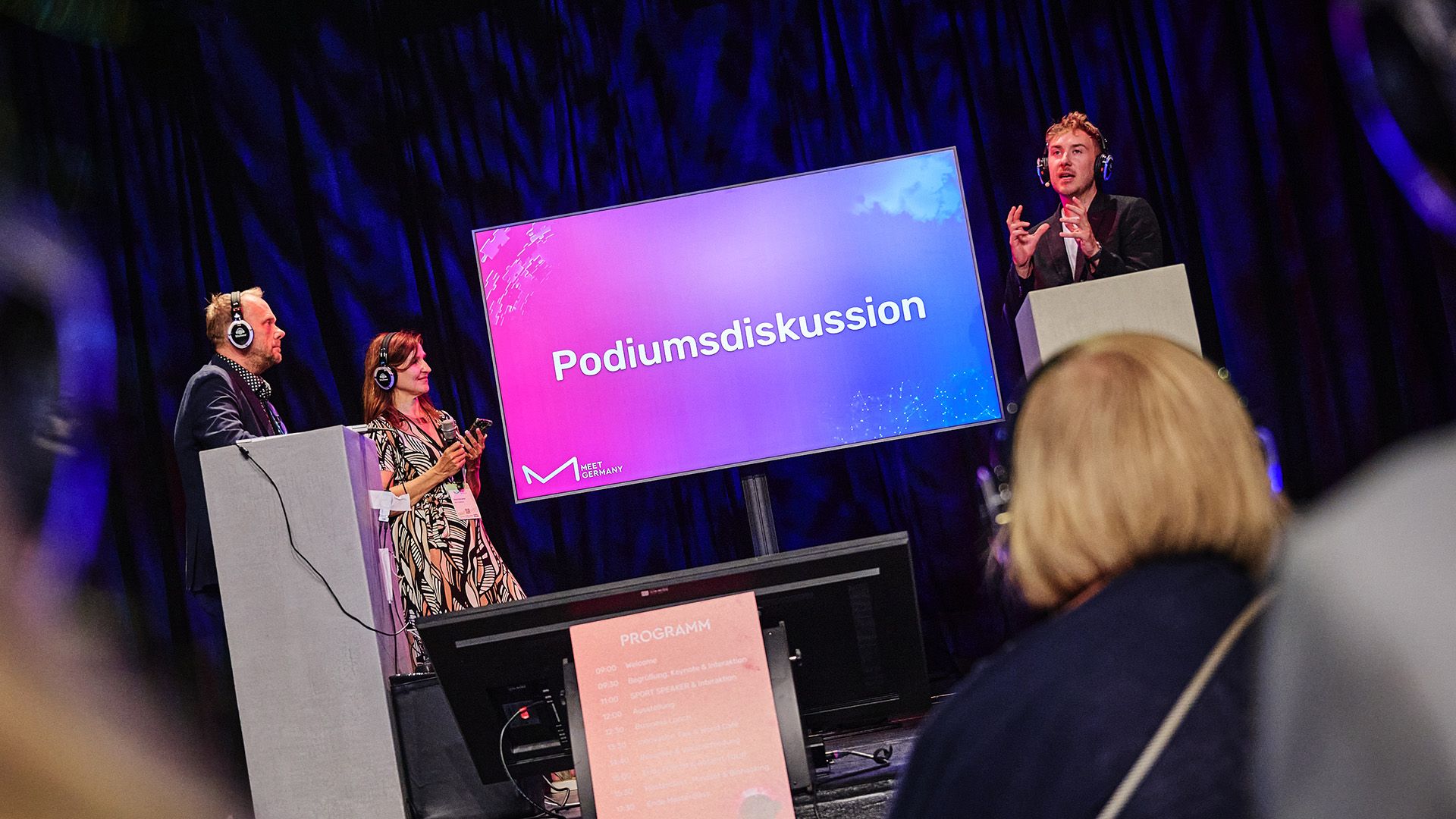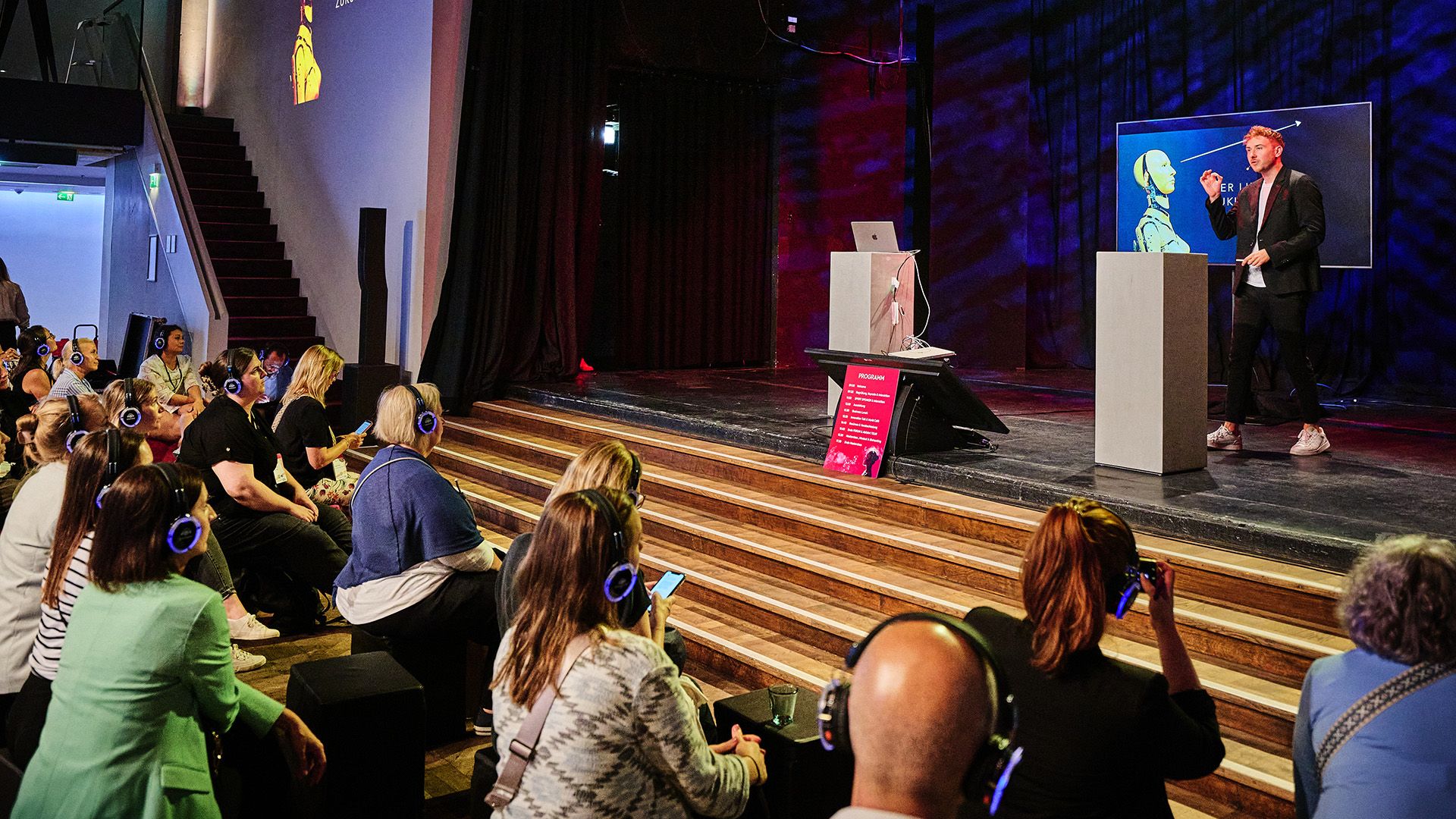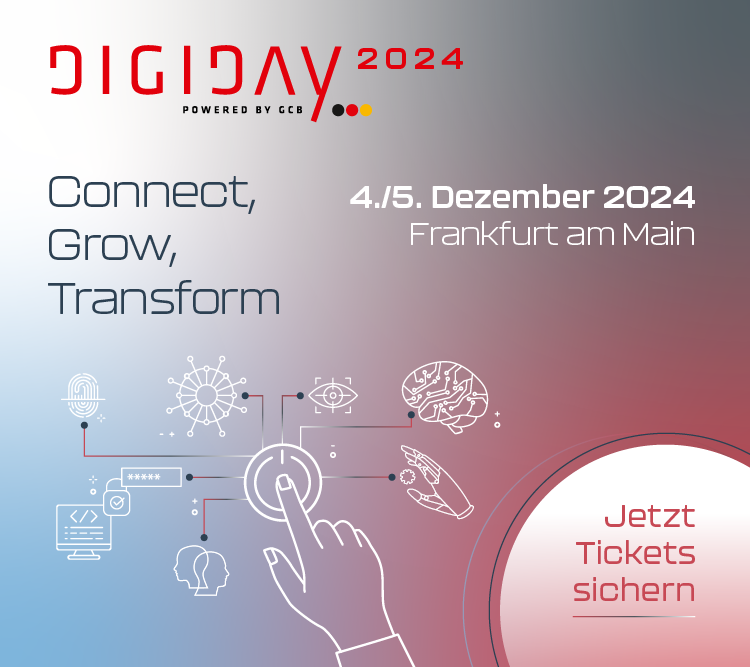
Interview Tristan Horx
"I always argue in favour of chance".
Futurologist Tristan Horx on 4 September 2024 at the Meet Germany Summit Rhein-Main at Palais Frankfurt. In his keynote speech "Transformation and GenZ", he took a look at the future of digitalisation, mobility, globalisation and sustainability. Photo: Meet Germany, Oliver Wachenfeld
Futurologist Tristan Horx on 4 September 2024 at the Meet Germany Summit Rhein-Main at Palais Frankfurt. In his keynote speech "Transformation and GenZ", he took a look at the future of digitalisation, mobility, globalisation and sustainability. Photo: Meet Germany, Oliver Wachenfeld
A conversation among millennials: trend and futurologist Tristan Horx on generational clichés, mutual understanding and well-planned coincidences in event design.
tw tagungswirtschaft: How do you see the future of the events industry? What developments are needed to remain relevant?
Tristan Horx: Events will have to become more personalised. In the past, many events were characterised by a veritable "compulsory attendance". Many events have become bigger and bigger over time, often without increasing the added value for participants. After the pandemic, the whole thing was recalibrated - and it is becoming increasingly clear that the real magic happens between the guests, not during a frontal presentation by a speaker. If you just want to listen to the talk, you can do that just as well on YouTube. Events should therefore specifically encourage interaction between people.
You declare Gen Z to be the "loneliest generation" in your keynote. How does this influence event design?
The social deficits caused by the lockdown are particularly noticeable among the younger generation. I think you have to be a bit lenient. When you've had less direct contact for two years and are only just learning how hierarchies and social interactions work, it naturally leaves its mark. I think the event industry could still learn from this. However, it is extremely difficult to artificially create "real" social interaction. Speed-dating-like formats often seem artificial and awkward. In my opinion, that's why chance is so important, especially with regard to the younger generation. The formula should be to use the digital possibilities to bring the right people to the right place at the right time - and not to digitalise the event itself.
Photo: Meet Germany, Oliver Wachenfeld
"The diversity of generations is a real treasure for a resilient, sustainable event industry."
Three questions for Tanja Schramm, Managing Director at Meet Germany, about the importance of the future at the Meet Germany Summits.
Gen Z in particular is at the centre of current discussions about generational conflicts. What makes them so special, and have there been such debates with previous generations?
In fact, we are now experiencing a situation in which Generation Z is receiving a lot of attention - because they are a "scarce commodity" due to demographics and are therefore becoming an economic factor. However, the typical clichés we hear today about the "young, lazy and stupid" generations are by no means new. Back in the 1950s, for example, Time Magazine took a detailed look at the younger generation of the time and analysed their characteristics. It was later said that the baby boomers were "effeminate and stupid" because they didn't have to go to war. Generation X and our own generation were also criticised - for example, we were accused of just "searching for meaning" and labelled as "lazy good-for-nothings". This is now being repeated in a similar way with Generation Z.
But this discussion seems much bigger today?
In the past, generational analysis was primarily a moral, value-driven discussion. Now it has a direct economic impact: Companies are feeling the shortage of skilled labour, and if this puts a strain on the economy, the topic will also be picked up more by the media. What's more, Gen Z is the first to have grown up entirely in the digital age and has come together through social media and platforms. This is perhaps why they tend to be perceived as a kind of "homogeneous mass".

From the left: ChatGPT expert Michael Maus, Tanja Schramm, Managing Director of Meet Germany, and Tristan Horx at the Meet Germany Summit Rhein-Main 2024. Photo: Meet Germany, Oliver Wachenfeld
In conversations with "Gen Z-ers", however, most of them seem quite annoyed by this, as well as by the prevailing prejudices ...
Yes, I can confirm that. Recently I had the opportunity to lecture Bachelor students in their 20s in Heidelberg. They're really annoyed by it. According to my findings: Young men are becoming more and more conservative, while young women, on the other hand, are becoming more and more liberal. This shows that categorisation by age is simply not a very good indicator of values these days. You could almost say that the post-generational age is now beginning. There are 60-year-olds who are totally young at heart and 25-year-olds who look more like pensioners - all they want is a Porsche, a house and a family. What you might call stuffy. When we were young - and we're still young (laughs) - the motto was always: "Collect moments, not things." Possessions weren't so important; instead, we had post-materialistic tendencies and were more interested in experiences. In contrast, the younger generation today is growing up in a time of scarcity, and status and possessions are becoming more important again - you can see this in the return to designer clothing, for example. That wasn't so common here. This is also what makes the "Z-ers" so interesting, because they embody this counter-trend.
Recursion theory
According to the so-called "recursion theory", the dynamics of trends and their counter-trends are a decisive driver of social change: in this interplay, new syntheses would emerge that eliminate contradictions and raise society to a higher level of complexity. Megatrends such as globalisation or individualisation would shape long-term developments, but generate equally strong counter-trends aimed at change and adaptation - such as de-globalisation or the pursuit of community. This dialectic lends crises a transformative function by breaking up established patterns and creating space for innovative, sustainable solutions. In this way, progress and change would emerge as the result of a continuous balancing act between existing trends and their further development.
You also talked about the "gender value gap". If there are these opposing trends within Generation Z, why is it described as more conservative as a whole? Are the young women reacting to the values of the young men?
There are indeed differences that manifest themselves above all in views on gender roles or family structures. However, conservative tendencies are also evident in areas such as property and ownership, i.e. values that are not gender-dependent - and this also applies to many young women. This is precisely what makes it more difficult to view Gen Z as a uniform generation. Gen Z women and Gen Z men should actually be analysed separately. Interestingly, the different genders usually want to please each other and interact with each other. One exciting, very recent trend is the so-called "Tradwife" movement on TikTok. "Trad" stands for "traditional", and this movement shows women who consciously adopt the traditional role model, i.e. stay at home, subordinate themselves to their husbands, cook, bake and present themselves in floral dresses. It's a huge movement, and whether you like it or not, you have to engage with it if you want to understand this generation as a whole.
Representatives of certain German parties also like to talk about the image of "real men" on TikTok ...
If you look at the figures, young men are indeed increasingly voting for the AfD, and that also has to do with these ideas. The party deliberately plays on traditional images of masculinity. There is this perceived pressure on men to become more "feminine" - to show emotions, be more sensitive and so on. Many young men don't want to go along with this and tend to take refuge in the opposite. Then someone comes along and says: "Role models used to be better, let's go back to that time." As a result, many develop a nostalgia for a time they don't even know. They have an idealised idea of how things used to be. And that seems to be enough - probably also because there are hardly any male role models who convey a modern yet strong image of masculinity. Instead, there are figures like Andrew Tate who embody toxic masculinity. On the other hand, there is a lack of role models who credibly represent this "sensitive", "more feminine" masculinity - but I'm still working on the perfect explanation for this.

The linear future error is one of the most common errors in thinking when considering and planning the future: a trend considered in isolation is simply extended from the past into the future without taking systematic reactions, adjustments or changes (counter-trends) into account. Photo: Meet Germany, Oliver Wachenfeld
In your presentation, you mentioned that the emotional low point for people is around the age of 35. In an era of accelerated change - and in view of the fact that we are getting older and older - this low point could possibly be pushed back. Especially when we think of Generation Alpha, which is expected to have the highest life expectancy, the question arises: will this also change the dynamics of the life course?
It's exciting to see how the phases of life are changing. We used to have three clearly defined phases: the education phase, the employment phase and retirement. Things are different today. There are more such phases that we go through. And every time we enter a new phase, we experience a kind of transitional crisis. You can think of it like a staircase, where each step brings a new challenge that "forces" us into the next phase. Therefore, it could even be that the more intense crises, such as the aforementioned low point, are experienced earlier rather than later. But that is just a prediction. The first major life crisis for most people is puberty - the classic, so to speak. This is followed by the career period, which used to be accompanied by starting a family. Today, however, it is often the case that people first work for several years in order to be financially stable enough to start a family. And what is striking is that the "arrow" of well-being often points upwards when starting a family begins. Having a family makes many people happy.
The U-curve of life
The U-curve of life is a concept in happiness research that describes satisfaction and well-being over the course of a person's life. This phenomenon shows that life satisfaction typically follows a U-shaped curve: It starts relatively high in youth, then declines and reaches its lowest point in middle age before rising again in later life. The reasons for this progression are varied and can be linked to changing life circumstances, expectations and priorities, among other things.
You also say that we are "giving the years more and more life". So the transition to old age is also changing today, isn't it? And what formative events are then added to the biographies?
One example is the frequency of lifetime partners. Today, people are more likely to have several long-term relationships that then end, each representing a kind of biographical caesura. Such a break-up often brings about major changes - many people move house afterwards or change their lives fundamentally. The traditional model of marrying at 25 and staying together for the rest of your life has become the exception rather than the rule. Today, people have at least three long-term relationships on average, and this has a strong influence on their biography. I also hear more often that parents move back to the big city after the children have left home and enjoy life. This phase used to be rare. And then it can happen that you even find a new partner during this phase, which leads to a new phase in your life. So you can see that biographies today generally have more phases that follow each other more quickly.
In view of these increasingly rapid developments: Doesn't this only increase the intergenerational lack of understanding?
Absolutely. A good example is the phenomenon of Generation Z suddenly discovering Harry Potter for themselves and then ridiculing our generation, the millennials, for being so attached to these stories. And we're not even talking about a conflict between Baby Boomers and Gen Z, but between Generation Y and Z. In my memory, 9/11 was our big crisis that completely changed our world. We were still living through a period when we were doing well; we were still living through the end of the millennium boom just before the dotcom bubble. Generation Z has already experienced such crises several times - the financial crisis, the pandemic, the war in Europe. And they have experienced all of this in the attention economy, with their smartphones. Imagine that: At 14, all you really want to do is watch funny TikTok dance videos and suddenly you're confronted with serious global issues - your childhood is over. I think that's really dangerous. There's also a certain irony in that. I research these topics myself, and yet I realise that I sometimes fall into the same clichés. When I think that TikTok could "dumb down" younger people, I feel a bit like previous generations who used to rant about television or the internet. But maybe it's just generational envy, because you know that one day you'll just be a tourist in the world of younger people. Nevertheless, I can well imagine that at some point we will introduce age restrictions for social media, similar to those for alcohol consumption. One model I could imagine is a kind of "cot" for devices: these would be specially configured smartphones or tablets that are integrated into a separate network. This would allow children and young people to only access age-appropriate content without unsuitable apps or content creeping in. It's a difficult balancing act, as children without smartphones are often the target of bullying these days when everyone else has one.

